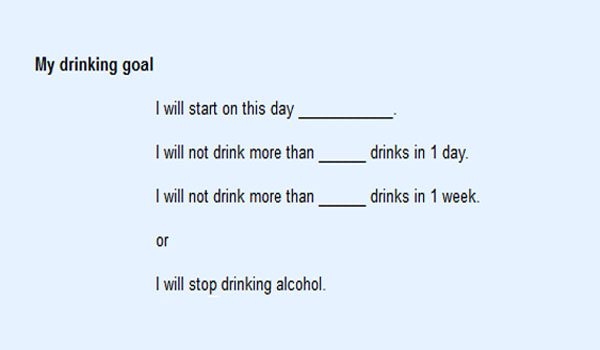Health Pages
Cut Down on Your Drinking
Cut Down on Your Drinking
If you found your self reading this page, then you are probably thinking about how much and how often you drink alcohol. Although moderate drinking of alcohol may have some health benefits for some people, most health practitioners will not promote alcohol consumption as a way for people to improve their health. Alcohol is commonly used by people when out socializing, but keep in mind that it is a mood altering drug which if used in excess can have harmful consequences for you and also for people around you.
If you're unsure how much you drink, keep a drinking diary for a couple of weeks, like the one below. If you're overdoing it a bit, it's easy to make a plan to cut down because people with a mild alcohol use disorder may recover with little or no treatment. Abstaining is the safest course for most patients with alcohol use disorders. If you are unwilling to abstain, you may be successful at cutting down.
Participation in a mutual support group like AA (Alcoholics Anonymous) or any another similar mutual support group is a way to acquire a network of friends who have found ways to live without alcohol.
There are probably many good reasons why you may want to cut down or stop drinking. You may want to improve your health, sleep better, or get along better with your family or friends. Because alcohol use can affect your health and can interfere with certain illicit and prescription drugs, over the counter medications and treatments, it is important that you are fully informed. Combining alcohol and drugs is always dangerous because you have no idea how the two will react inside you. It is important to make a list of the reasons you want to drink less and set a drinking goal. If you are cutting down, keep below these limits:
Women: No more than one drink a day
Men: No more than two drinks a day
A drink is:
 a 12-ounce bottle of beer;
a 12-ounce bottle of beer;
 a 5-ounce glass of wine; or
a 5-ounce glass of wine; or
 a 1½-ounce shot of liquor.
a 1½-ounce shot of liquor.
Note:These limits may be too high for some people who have certain medical problems or who are older. Talk with your doctor about the limit that is right for you.
Don't forget to write your drinking goal on a piece of paper and put it where you can see it (like refrigerator or bathroom mirror). Your paper might look like this:
To help you reach your goal, keep a drinking diary of your drinking. For example, write down every time you have a drink for 1 week. Try to keep your diary for 3 or 4 weeks. This will show you how much you drink and when. You may be surprised.
There are many ways you can help yourself to cut down. For more information check our page How to Cut Down on Drinking.
DO NOT GIVE UP!
Most people do not cut down or give up drinking all at once. Just like a diet, it is not easy to change. That is okay. If you do not reach your goal the first time, try again. Remember, get support from people who care about you and want to help. Do not give up!
So, if you are thinking about cutting down alcohol or want to find more information about effects of alcohol on health, have a look at information provided below.
Learn more:




